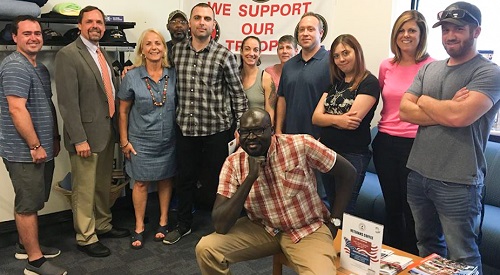Many Veterans who transition back into civilian life choose to do so by pursuing undergraduate or advanced degrees. Some Veterans who enter a college or university may need assistance with adjusting to the new culture or managing physical or mental health challenges. Going from a familiar military life to something new and different — like school — can be difficult. VA provides counseling and resources that can help ease the transition.
VA’s Veterans Integration to Academic Leadership (VITAL) program connects Veterans with world-class health care to improve their overall mental health while also supporting their successful integration into college and university campus life.
VITAL offers seamless access to VA and campus-based resources, including transition counseling, mental health support, and assistance with accessing campus and VA programs and resources. It helps student Veterans by:
- Providing evidence-based on-campus mental health counseling by a clinically licensed mental health provider, such as a psychologist or social worker.
- Facilitating on-campus Veteran enrollment in VA programs.
- Working with Veterans to create individualized treatment plans and education goals to facilitate their successful academic and social integration.
- Collaborating with existing on-campus mental health providers or counseling centers.
VITAL operates at 24 VA medical centers, 4 Veterans Integrated Services Networks, and 144 colleges and universities across the country.
Since 2013, it has served 9,000 Veterans and provided 42,000 therapy appointments.
In action
The Bedford VA program is one example of VITAL’s community collaboration. Since 2011, this team has worked with multiple colleges and universities, including Northeastern University, Bunker Hill Community College, North Shore Community College, Middlesex Community College, and more. Since the program’s implementation, Bedford Veterans have seen tremendous progress, both in and outside of the classroom. VITAL participants shared their experiences in a new video produced by the Bedford VA. Watch the full video or explore the highlights below.
“I was going through a lot of drama in my personal life — going through a rough divorce — and my living conditions were in an uproar. I met with a psychologist on the VITAL team. She would come to the campus and be here every Monday, and that was helpful … to navigate and transition my way back into school. I didn’t feel like I was doing it alone.” — Derek, VITAL participant
“Failing all my courses, I was behind in all my classes. But then in multiple meetings throughout that semester, we met up and set up a schedule. Utilizing those tools that I learned from VITAL, I ended up passing all my classes. I went from getting Ds and Fs for my first assignments and exams to getting As and Bs.” — Hessy, VITAL participant
Eligibility
You are eligible for VITAL services if you meet Veterans Health Administration eligibility criteria for health care services and are enrolled in the VA health care system. To apply for VA health care benefits, visit: va.gov/health-care/apply/application/introduction.
Learn More
To determine whether the VITAL program is available in your area, contact your community mental health point of contact at mentalhealth.va.gov/get-help/local-care/community-poc.asp.
For more information about VA’s services available for student Veterans, explore the VA Campus Toolkit at mentalhealth.va.gov/studentveteran and sign up to receive updates.
To learn more about the Bedford VA VITAL team, visit bedford.va.gov/services/VITAL.asp.
Alisa Bennett is a Licensed Independent Clinical Social Worker and VITAL Program Manager at the Bedford VA Medical Center.
Topics in this story
More Stories
The Medical Foster Home program offers Veterans an alternative to nursing homes.
Watch the Under Secretary for Health and a panel of experts discuss VA Health Connect tele-emergency care.
The 2024 National Veteran Suicide Prevention Annual Report provides the foundation for VA’s suicide prevention programs and initiatives.






